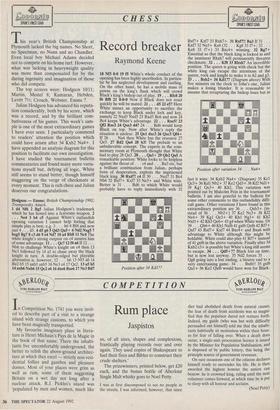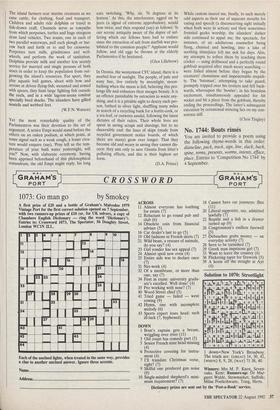PURI NIGHLAND MALT
COTrIl
1,3,f,RLON,
PURE HIGHLAND MALT
SCOTCH WHISKY
COMPETITION
Rum place
Jaspistos
In Competition No. 1741 you were invit- ed to describe part of a visit to a strange island with strange customs, to which you have been magically transported. My favourite imaginary place in litera- ture is Henri Michaux's Pays de la Magic in the book of that name. There the inhabi- tants live uncomfortably underground, the better to relish the above-ground architec- ture at which they excel — strictly non-resi- dential follies and gazebos and pleasure domes. Most of your places were grim as well as rum, some of them suggesting Britain on a wet day not long after a nuclear attack. R.J. Pickles's island was `populated by men and women, much like
us, of all sizes, shapes and complexions, frantically playing records over and over again. They used copies of Shakespeare to fuel their fires and Bibles to construct their crude shelters.'
The prizewinners, printed below, get £20 each, and the bonus bottle of Aberlour Single Malt whisky goes to Noel Petty.
I was at first discomposed to see no people in the streets. I was informed, however, that since diet had abolished death from natural causes, the fear of death from accidents was so magni- fied that the populace dared not venture forth. Indeed, my guide (who was but with difficulty persuaded out himself) told me that the inhabi- tants habitually sit motionless within their hous- es for fear of falling over. When a death does occur, a single-unit procreation licence is issued by the Minister for Population Stabilisation, and is disposed of by public lottery, this being the principle source of government revenues. On rare occasions one of the citizens declares himself ready to surrender his life. He is then awarded the highest honour the nation can bestow: he is crowned king, ruling until the next volunteer comes forward, at which time he is put to sleep with all honour and acclaim. (Noel Petty)
The island farmers rear marine creatures as we raise cattle, for clothing, food and transport. Children and adults ride dolphins or travel in fish-drawn craft. Channels serve as towpaths from which porpoises, turtles and huge sturgeon draw land vehicles. Two teams, one in each of two parallel waterways, pull each plough or har- row back and forth or to and fro crosswise. Porpoises turn mills, grindstones and well- wheels, and perform the work of sanitation. Dolphins provide milk and another less seemly service for married and single persons of both sexes in order to keep the population from out- growing the island's resources. For sport, they Play aquatic ball games, shoot with bow and arrows at driven flying-fish; mounted and armed with spears, they hunt large fighting fish outside the reefs, and in a wide lagoon-arena combat specially bred sharks. The islanders have gilled nostrils and webbed feet.
(W.F.N. Watson) Yet the most remarkable quality of the Parlamentros was their devotion to the art of argument. A senior Empi would stand before the others on an oaken podium, at which point, at some signal such as a weak cough, a lesser crea- ture would enquire (say), 'Pray tell us the tem- perature of your bath water yesternight, will you?' Now, with elaborate ceremony, having been apprised beforehand of this philosophical conundrum, the old Empi might reply, his long
ears twitching, 'Why, sir, 76 degrees at its hottest.' At this, the interlocutor, egged on by jeers (a signal of extreme approbation), would bow twice, and then respond (say) as follows: 'Is our serene antiquity aware of the degree of suf- fering which our fellows have had to endure since the extraction of salt from starfish was pro- hibited to the common people?' Applause would follow, and old eggs be thrown at the elderly Parlamentro if he hesitated.
(Glen Lillebrew) In Ozonia, the westermost CFC island, there is a morbid fear of sunlight. The people, of pale and waxy hue, live entirely by moonlight, moon- bathing when the moon is full, believing this pro- longs life and enhances their meagre beauty. It is an offence punishable by ostracism to waste any- thing, and it is a pitiable sight to descry each per- son, bathed in silver light, shuffling many miles in search of a recycling bank for a bottle-cork, or a tea-leaf, or outworn sandal, following the latest dictates of their rulers. Their whole lives are spent in saving scraps and shavings, but to no discernible end: the lines of skips (made from recycled government notice boards, of which there are many) grow ever longer. That they become old and weary in saving they cannot dis- cern: they aim only to save Ozonia from litter's polluting effects, and this is their highest art form.
(D.A. Prince) While custom inured me, finally, to such merely odd aspects as their use of separate mouths for eating and speech (a disconcerting sight initially when both were in action) and their sometimes frenzied gecko worship, the islanders' darker side continued to appal me; the spectacle, for instance, of an adulterous counsellor being flung, chained and howling, into a lake of seething slimejuice left me sick for days. Alas, my attempts to soften them by teaching them cricket — using driftwood and a perfectly round gobfruit acquired after much weary searching were foiled almost before they began by the creatures' clumsiness and impenetrable stupidi- ty. The 'batsman', attempting to take guard, promptly tripped over his trotters and fell back- wards, whereupon the 'bowler', in his brainless excitement, simultaneously appealed for hit wicket and bit a piece from the gobfruit, thereby ending the proceedings. The latter's subsequent execution by ceremonial mincing lies on my con- science still.
(Chris Tingley)
No. 1744: Bouts times
You are invited to provide a poem using the following rhyme-words in this order: disincline, pack, track, sign, line, slack, back, spine, terms, presents, worms, intents, efface, place. Entries to 'Competition No 1744' by 4 September.











































 Previous page
Previous page